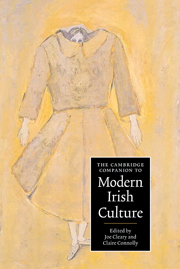Book contents
- Frontmatter
- 1 Introduction: Ireland and modernity
- Part I Cultural politics
- 2 The survival of the Union
- 3 Language, ideology and national identity
- 4 Religion, identity, state and society
- 5 Republicanism, Nationalism and Unionism
- 6 Irish feminism
- 7 Migration and diaspora
- 8 The cultural effects of the Famine
- Part II Cultural practices and cultural forms
- Index
8 - The cultural effects of the Famine
from Part I - Cultural politics
Published online by Cambridge University Press: 28 May 2006
- Frontmatter
- 1 Introduction: Ireland and modernity
- Part I Cultural politics
- 2 The survival of the Union
- 3 Language, ideology and national identity
- 4 Religion, identity, state and society
- 5 Republicanism, Nationalism and Unionism
- 6 Irish feminism
- 7 Migration and diaspora
- 8 The cultural effects of the Famine
- Part II Cultural practices and cultural forms
- Index
Summary
Introduction
This chapter shows how the Great Famine of 1845 to 1852 was the single most important event in Ireland in the modern period. In European terms, famine had become an increasingly remote event, and that Ireland should suffer a devastating episode was made all the more unusual in that it then formed part of the richest, most powerful and centralised state in the world - the United Kingdom created by the Act of Union in 1800. The Famine disproportionately impacted on the 3 million potato dependent people who comprised the notoriously poverty-stricken base of Irish society. These effects were compounded by doctrinaire government policies, designed as much to appease British opinion and to promote social engineering as to alleviate poverty or save lives. Over 1 million people died and 2 million more emigrated within a decade: the population of the island halved by 1900, the result of endemic emigration by young people, delayed marriages and abnormally high rates of celibacy.
The Famine therefore marked a water shed in many areas of Irish life – demographics, economics, society, culture. Yet the immediate response appears sluggish. Indubitably, Ireland remained culturally comatose in the immediate post-Famine period. The period from the 1880s, when the post-Famine generation took over, witnessed the creation of a series of radical responses to the Famine legacy, of which the Irish literary revival is one. Many other initiatives were also undertaken, inspired by people themselves born during the Famine. The best-known examples include Michael Davitt, founder of the Land League in 1879, and Michael Cusack, founder of the Gaelic Athletic Association in 1884.
- Type
- Chapter
- Information
- The Cambridge Companion to Modern Irish Culture , pp. 137 - 154Publisher: Cambridge University PressPrint publication year: 2005
- 5
- Cited by



